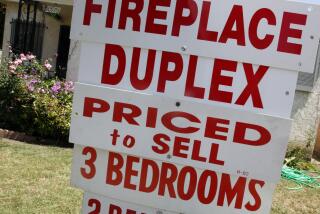YOUR MORTGAGE : Exotic Loans Can Match Special Circumstances
- Share via
WASHINGTON — They’re called niche products in the home mortgage trade. They’re often not advertised to the general public, even by the firms that fund them.
But they’re big business, and they could be precisely what you need to solve a particular problem--if you simply knew they existed and where to search for them.
Welcome to the burgeoning world of home mortgage exotica, where the rules for borrowers that you thought were cast in concrete can be very flexible. For example, say you need substantial cash quickly to invest in a promising business venture with friends. You’ve got assets, but they’re relatively illiquid, like your pension plan and your house. Or they’re subject to transaction charges you’d prefer to avoid, like back-end loaded mutual funds.
So how about this: Take out a mortgage equal to 125% or even 150% of the value of your house. What? Aren’t there strict rules that mortgage lenders follow that limit the maximum loan amount to some fraction of the appraised market value of your home--typically no higher than 95%? Sure. But there are lenders who will go not only to 100% but to 110%, 125% of appraised value or higher.
You should be able to find them if you talk to an experienced mortgage broker in your area, one who has regular working relationships with national, regional and local investors. The sources of funds, by the way, tend not to be fly-by-night outfits. They may be mortgage or consumer finance subsidiaries of large commercial banks.
Here’s how 100%-plus loans work: Say you need $70,000 cash for personal or investment purposes. You’ve got a solid income and you’ve got stocks, bonds and other financial assets you don’t want to touch. Your house is worth $200,000, and you have a $175,000 mortgage on it.
Taking out a second mortgage--even if a local bank would consider it, given your thin equity--won’t raise the cash you need. One solution: A $245,000 refinanced mortgage that stretches the traditional loan-to-value limits beyond what you ever imagined was possible. The $245,000 equals 122.5% of the appraised value of your house.
A mortgage broker in the Maryland suburbs of Washington, for instance, offers competing 100%-plus programs from subsidiaries of two large national commercial banks. Dale Gray, president of Graylin Mortgage Co. of Rockville, Md., calls both programs “highly selective but quite helpful” for the people who qualify.
Rates are above the going level, typically bank prime (8.75%) plus two percentage points. Loan closing is fast, usually less than a week to delivery of cash after verification of deposits and other assets. The idea here, Gray says, is that the lender is making a combination of personal loan and mortgage loan, based on the strong credit profile of the borrower. Foreclosure of the house in the event of non-payment won’t provide full recovery for the lender, in other words. But the lender can get a court judgment against the borrower’s other assets to satisfy the full debt should the loan go sour.
A mortgage solution for the average consumer? Hardly. But if you fit the financial profile and have a need for speed, the concept could be worth a look. One caveat on 100%-plus loans, though: Consult your tax adviser about interest deductions. On audit, the IRS could challenge mortgage interest write-offs on any part of your financing that exceeds the full appraised value of your home.
Other specialized niche programs available through mortgage brokers that may fit your needs:
- Innovative “nearly 100%” financing for custom home buyers who want to buy a lot and build a new house. One program requires a $5,000 to $10,000 deposit up front into escrow, then funds 100% of the lot purchase, lot preparation and construction costs through a series of “drawdowns.” The rate on this short-term construction loan is bank prime plus 1%. After construction is complete, a permanent 30-year mortgage at prevailing market rates pays off the construction loan. No further cash--beyond the deposit money and settlement charges--is required to close the long-term mortgage.
- Super “low doc” refinancing for the self-employed business person who normally has to provide far more documentation to lenders than other applicants. The New York subsidiary of one bank provides jumbo mortgages from $203,000 to $1 million with virtually none of the usual income, employment or asset documentation. You tell the lender nothing about what you earn, nothing about what’s in the bank, what car you drive, etc. You don’t even permit the lender to check your federal tax filings. The entire application consists of one page.
The hitch: The maximum loan to value is 60%--you’ve got to be an equity cream puff--and the property has to be appraised twice, once by an appraiser hired directly by the bank. The name of the game here? For your privacy you pay extra--as much as three-quarters of a percentage point above prevailing jumbo rates.
Distributed by the Washington Post Writers Group .
More to Read
Inside the business of entertainment
The Wide Shot brings you news, analysis and insights on everything from streaming wars to production — and what it all means for the future.
You may occasionally receive promotional content from the Los Angeles Times.










